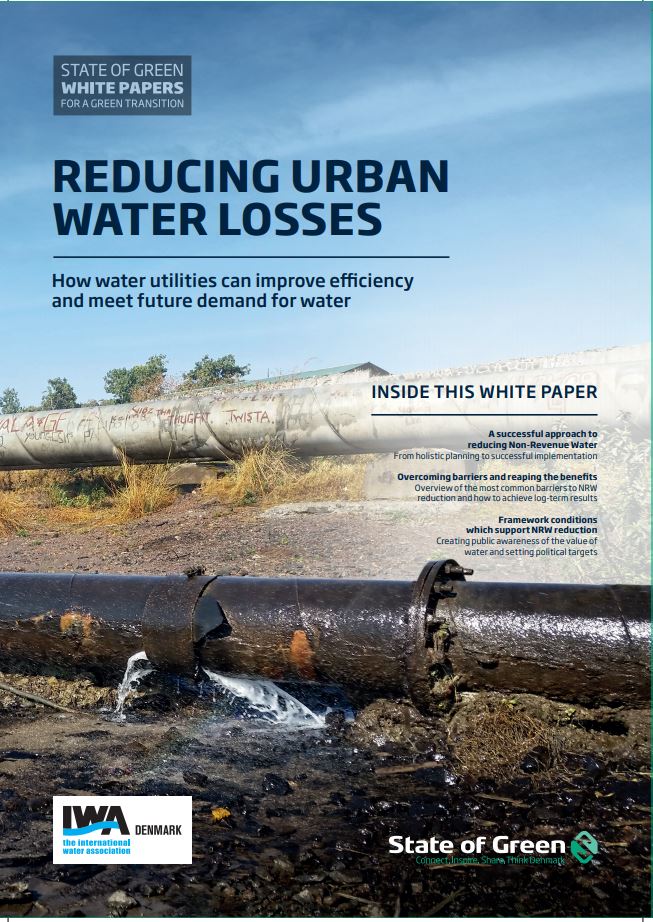Download our publication on reducing urban water loss today
This article is part of our publication ‘Reducing urban water loss’.
Download nowPerspective
Non-revenue water


It requires extra attention and improved service to convince consumers that water has a value and that the water bill is a sign of priceless and essential needs. Consumers must be educated to appreciate the value of having a stable supply of safe drinking water and to treat the supply with respect. This requires both political attention and political prioritisation.
The awareness and understanding of the value of water is very limited in many countries. Often, the price of water does not cover the actual investment and operational costs. Political focus and priority from government institutions is required in order to make consumers aware of the value of having a stable supply of clean tap water. Subsidising the water price should onlybe used to support the poorest in having access to drinking water and the price for water should reflect the actual costs. In many places, the apparent loss poses the biggest challenge and it takes a change in consumers’ mindsets to bring it down. NGOs and anthropologists can be involved in changing people’s mindset and behaviour when it comes to drinking water as well as their understanding of how consumer payment for water is necessary to ensure sufficient funding for the development of a sustainable water supply with clean and safe water.
Denmark has shown that economic growth and decreasing resource consumption are not mutually exclusive; they can in fact go hand in hand successfully. Danish water consumption has decreased by 40 per cent over the last thirty years while the country’s GDP has increased by 75 per cent. Continuous awareness about the importance of saving water together with tax incentives have resulted in water consumption figures that are acknowledged worldwide. In 2019, water consumption in Denmark per capita on average was 101 l/day. The total price for water supply and wastewater treatment is an average of EUR 9.5 per m3, meaning that the price is also a strong incentive to reduce consumption.
The national average for non-revenue water has been reduced to 6.5 per cent due to intensive focus on the problem. Government regulations have motivated water utilities and technology providers to develop new, cost-efficient leakage monitoring technologies and leakage management systems. The highly efficient Danish water distribution system can also be reflected in the fact that the ILI in 2019 was on average 0.6.

This article is part of our publication ‘Reducing urban water loss’.
Download nowEconomic incentives are important drivers for affecting behavioural change. For decades, politicians and decision makers in Denmark have understood that public regulation and taxes are important and effective tools for behavioural change. For more than 25 years, regulations have stipulated certified metering of all water consumption at the consumer level in Denmark. Furthermore, Danish authorities impose high penalties on water utilities that do not reduce their NRW level to less than 10 per cent through extra taxes on water lost. Benchmarking for efficiency Benchmarking can also be a tool for water utilities to identify performance and optimise their respective work processes and methods by learning from best practice examples of their cohort. Each year, the Danish Water and Wastewater Association (DANVA) collects and publishes performance data – including NRW data – from
more than 130 Danish water utilities in an annual benchmarking report, which allows each water utility to learn from its peers.
Climate change mitigation and reduction of CO2-emissions is increasingly attracting political attention across the globe. It therefore makes sense to address reduced energy consumption as a positive spillover effect of NRW reductions when considering the efforts and expected results of an NRW
programme. Reducing NRW will dramatically change the operation of the water distribution, as the change in pressure and closing of leaks in particular can lead to considerable energy savings. In addition to reducing CO2 emissions, reducing NRW contribute to achieving the UN Sustainable Development Goals. This is especially so in the case of SDG 6: Clean Water and Sanitation, however also in regards to several other of the SDGs such as
SDG 11: Sustainable Cities and Communities
SDG 3: Good Health and Well-Being
SDG 12: Responsible Consumption and Production